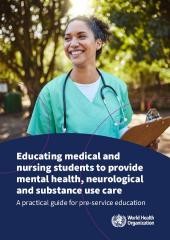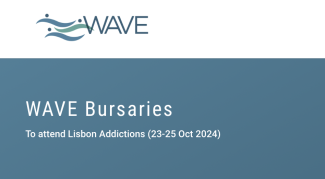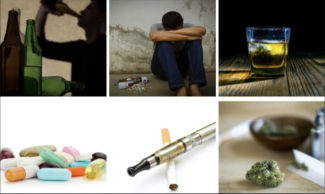Search
Development of Curricula and Sustainability of University-Based Master’s Programmes in Addiction Studies: A Pilot Comparative Study
INTRODUCTION:
Addiction studies programmes are very diverse around the world. To respond to the public health perspective needs to decrease problems related to drug use, empowering the addiction workforce in a sustainable way is a relevant...
Educating medical and nursing students to provide mental health, neurological and substance use care: A practical guide for pre-service education
Pre-service education sets the foundation for preparing health professionals to provide services within health systems. Educating medical and nursing students to provide mental health, neurological and substance use care: A practical guide...
Supporting the Journey: A Reading List for Addiction Nurses
In-country INEP Plus Training by ISSUP Malaysia: Journey and Lessons
The Power of Collaboration Project: Substance Use Disorder treatment for women
The Power of Collaboration is a joint project between ISSUP and the GWN. This initiative delves into three critical areas in substance use disorder (SUD) treatment for women:
-
MIND THE GAP: GLOBAL SURVEY EXAMINING ACCESS FOR SUBSTANCE...
Implementing Quality Measurement in the Field of Drug Treatment and Harm Reduction: A Case Study in Flanders
BACKGROUND:
Implementing quality measurement is still a challenge in the field of drug treatment and harm reduction. In this case study, we investigate which strategies can be used to enhance the implementation of a policy in which quality...
National Implementation of Quality Standards in Prevention and Treatment Services for Substance Use/ Addictions – A Case Study of Cyprus
INTRODUCTION:
The Cyprus National Addictions Authority (NAAC) is the main coordinating body for all matters related to licit and illicit substances as well as pathological gambling in Cyprus and it is responsible, inter alia, for the...
Substance Use Disorder Treatment Quality Standards in Lithuania 1992–2022: From Grassroots Initiatives to Nationwide Strategies
BACKGROUND:
The implementation of quality standards in the treatment of substance use disorders in Lithuania is not well documented in the literature.
AIMS:
To describe the process of the development of quality standards from grassroots...
Implementation of Quality Standards in Drug Demand Reduction: Preliminary Findings from the FENIQS-EU Project
INTRODUCTION:
Quality Standards (QS) are an important priority in European drug policy, although the extent of their application remains unclear. The FENIQS-EU project (Further ENhancing the Implementation of Quality Standards in drug...
Pharmacy Automation in Rehabilitation Centres
Selected Lifestyle Factors of Candidate Sperm Donors and Their Effect on Spermiogram Values in the Moravian Part of the Czech Republic. Study Protocol
INTRODUCTION:
Male infertility affects nearly 14% of men in Europe, and approximately 44% of them are unaware of the cause of their infertility. Thanks to the plentitude of research, we can now clearly define the risk factors that...
Rehabilitation of Executive Functions in Users of Addictive Substances. Study Protocol
BACKGROUND:
Substance use increases the risk of damage to executive and cognitive functions. Manifested by a range of clinical symptoms, such impairments may affect people’s coping with everyday activities and their abilities to establish...
Review of Competency-Based Models and Quality Standards in Training and Education in the Addiction Field: Study Protocol
BACKGROUND:
There is a growing trend of development and improvement of education and training in the field of addictions, hand in hand with the increase and changes of substance use-related issues. To ensure a high level of education...
WAVE Bursaries to attend Lisbon Addictions 2024
Stigmatizing imagery for substance use disorders: a qualitative exploration
Who Helps The Helper? A Skills Transfer Program for Behavioural and Substance Use Professionals
Substance Use Disorders (SUD) and Type 2 Diabetes: Integration of Evidence-Based Diabetes Care to Promote Quality Health Outcomes
Use of Medication for Opioid Use Disorder Among Adults With Past-Year Opioid Use Disorder in the US, 2021
Discussion
Despite guidelines recommending MOUD, approximately 1 in 5 adults with past-year OUD received any MOUD. Furthermore, some groups were substantially less likely to receive MOUD, in particular Black adults, women, those unemployed...
Clinical Supervision in Botswana
Share the Knowledge: ISSUP members can post in the Knowledge Share – Sign in or become a member




